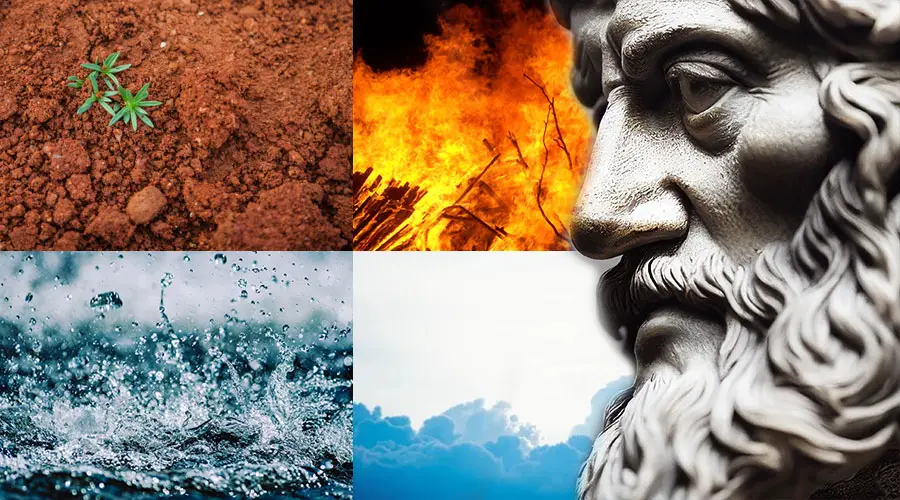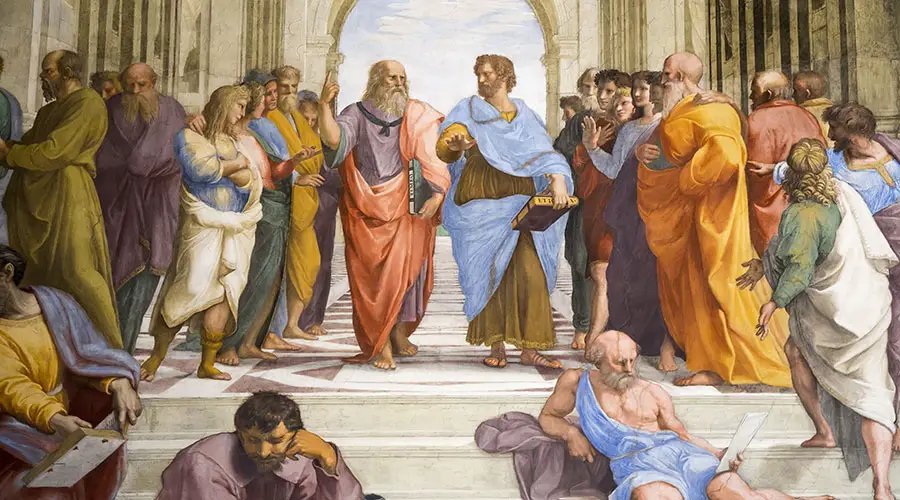Aristotle, one of the most important thinkers of all time, developed a theory that all matter was made up four elements. In this article we are going to look at his theory, and see how it has influenced later thinkers.
Aristotle believed that all matter was made up of four elements: earth, air, fire, and water. According to Aristotle’s philosophy, these elements each had their own unique properties and characteristics, and all physical objects were made up of varying combinations of these four elements.
The four elements had great philosophical meaning to Aristotle, and the other Greek philosophers.

Earth – Earth was considered to be the heaviest and most dense of the elements, and was associated with qualities such as solidity, stability, and dryness.
Air – Air was considered to be lighter than earth, and was associated with qualities such as movement, lightness, and wetness.
Fire – Fire was considered to be the lightest and most active of the elements, and was associated with qualities such as heat, brightness, and dryness.
Water – Water was considered to be intermediate between earth and air, and was associated with qualities such as fluidity, coldness, and wetness.
According to Aristotle, the elements could be transformed from one form into another, but they could never be created or destroyed. This philosophy formed the basis for much of the Western understanding of matter and the natural world for many centuries, and had a profound influence on the development of science and philosophy.
Aristotle was Inspired by Plato and Empedocles
Aristotle’s theory that all matter is made up of four elements was largely influenced by the ideas of his mentor, Plato, as well as by the earlier works of the philosopher Empedocles.
Plato recognized Aristotle as his greatest disciple and, according to Philoponus, referred to him as “the mind of the school.” if Aristotle were absent from the lectures, Plato would say: “the intellect is not here.”
Plato believed that the physical world was a manifestation of an underlying world of Forms or Ideas, and that all objects in the physical world were made up of a combination of these Forms. Empedocles, on the other hand, believed that all matter was composed of four basic elements, which he identified as earth, air, fire, and water.

Aristotle combined these ideas, developing a theory in which all matter was made up of a combination of four basic elements, each with its own unique properties and characteristics. He believed that the elements could be transformed from one form into another, but they could never be created or destroyed, and that the specific properties of each object were a result of the particular combination of elements that made it up.
Overall, Aristotle’s theory of the four elements was heavily influenced by the works of Plato and Empedocles, as well as by the prevailing ideas of his time about the natural world and the structure of matter.
The Influence of Aristotle’s Four Elements on Later Thinkers
Aristotle’s theory of the four elements of matter had a profound influence on later philosophers, scientists, and thinkers in a number of different ways. Some of the key ways in which his theory influenced later thinking include:
Natural philosophy: Aristotle’s theory of the four elements was an important part of his broader philosophical system, and it had a significant impact on the development of natural philosophy. His idea that all matter could be reduced to a combination of these four elements helped to lay the foundations for the scientific investigation of matter and the natural world.
Alchemy: The idea of the four elements was central to the development of alchemy, which sought to transform base metals into gold. Alchemists believed that by changing the proportions of the four elements in a substance, they could change its properties and transform it into a different substance.
Medicine: Aristotle’s theory of the four elements was also influential in the development of medicine. Physicians believed that the human body was made up of a balance of the four elements, and that health was maintained when these elements were in balance. Imbalances in the elements were thought to be the cause of many illnesses.
Astrology: The theory of the four elements was also important in the development of astrology, which held that the movements of the celestial bodies influenced the balance of the elements in the natural world and in human affairs.
Philosophy: Aristotle’s theory of the four elements was also an important part of his broader philosophical system, and it had a significant impact on later philosophers, including the Stoics, who used it as a basis for their own theories of the natural world.
Overall, Aristotle’s theory of the four elements of matter had a profound and lasting influence on a wide range of areas, from natural philosophy and science to medicine, astrology, and philosophy.
The Four Elements in Other Wisdom Traditions
The idea of the four elements can be found in many wisdom traditions throughout history. Some of the most notable include:
Hinduism: In Hinduism, the four elements are referred to as the “Mahabhutas,” or great elements. These elements are earth, water, fire, and air, and they are considered to be the building blocks of the physical world.
Buddhism: The Buddhist tradition also recognizes the four elements as fundamental components of the physical world. In Buddhist teachings, the four elements are associated with the four physical properties of earth (solidity), water (cohesion), fire (heat), and air (motion).

Native American Traditions: Many Native American traditions also recognize the concept of the four elements. In some Native American cultures, the elements are considered to be the building blocks of the physical world and are associated with the four cardinal directions.
Overall, the idea of the four elements can be found in many wisdom traditions throughout history, and it has been seen as a fundamental concept in the understanding of the natural world.
Recommended Reading
If you want to continue exploring this subject more deeply, you can see which books I recommend by clicking here.
